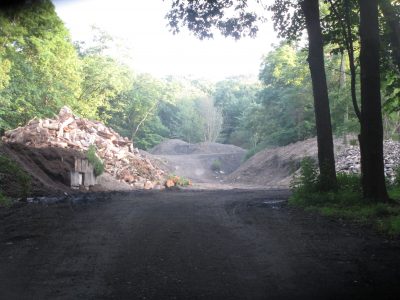Residents Raise Fear of Water Contamination in North Castle

North Castle’s storage of asphalt millings derived from its road paving program has once again ignited controversy as two town residents have charged that the practice could jeopardize water sources close to where the material is piled.
Longtime Windmill Farm resident Robert Greene, a former town Planning Board chairman, has argued that the storage of potentially tens of thousands of cubic years of “toxic” millings stored at the highway yard on Middle Patent Road could threaten the water supply for the nearby Windmill development of about 370 houses and Coman Hill Elementary School.
Similarly, the millings that have been stored at the town’s Highway Department in downtown Armonk threatens wells in Water District #4 that serves customers near that location, he contends.
It is a nearly identical argument that local developer Michael Fareri has been making for about four years, after North Castle started an aggressive paving program to rehabilitate all 93 miles of town road.
Greene said that the town has failed to take routine measures to prevent stormwater from infiltrating the piles and runoff from contaminating the groundwater.
“My position is not that our water is unfit to be used by our residents, but you can’t have that amount of millings on top of your aquifer,” Greene said. “It leaches.”
Instead of sending the millings to an asphalt plant for reuse, the town has been storing them at the two locations for at least the last four years after the repaving work and either uses the material for its own needs or provides it for free to other municipalities or developers upon request.
Last week Greene corresponded with potentially thousands of North Castle residents using the town’s e-mail list to make his points.
By last Monday evening, about 10 hours after Greene’s initial e-mail was sent, Supervisor Michael Schiliro fired back with his own response calling Greene’s assertions “fraught with misinformation.”
Schiliro said that the town follows the guidelines set by the state Department of Environmental Conservation (DEC), which is the regulatory agency that oversees the issue. If the town were to run afoul of any of the agency’s regulations, those would be corrected as soon as possible, he said.
So far, that hasn’t happened.
“We have no reason to work against the DEC, but that’s the guidelines,” Schiliro said. “We can’t make up our own guidelines or say that a resident thinks we’re doing it wrong, so let’s forget what the DEC says and let us do what our resident thinks because they know more.”
Fareri said that the millings contain various chemicals when they are taken off the road, including oil, gasoline, salt and calcium. He called it an “environmental disaster” waiting to happen and called on Schiliro to resign from office for failing to follow the town’s own procedures and regulations for stormwater runoff prevention.
“He has put many people in this community in harm’s way,” Fareri said of Schiliro. “That is why you do your due diligence. Mr. Schiliro and the Town Board are not educated on environmental issues.”
A DEC spokeswoman said the department is aware of the town’s storage of the millings and has been in contact with town officials but that the practice is fairly routine.
Spokeswoman Wendy Rosenbach said municipalities stockpile millings to repair roads, meeting the requirements of a DEC pre-determined Beneficial Use Determination (BUD) under the state’s solid waste regulations. The BUD does not include guidelines for storage, nor does it require a specific DEC permit, although it discourages any storage of the material in water, Rosenbach said. Standard wetlands rules also apply, she said.
“In this case, the asphalt millings cease to be a waste when the material meets the requirements for the intended use,” Rosenbach said. “Regulations state that recycled material or residue generated from uncontaminated asphalt pavement and asphalt millings meet a municipal specification for use as an ingredient in pavement and other paved surface construction and maintenance.”
Typically, millings that come off a road do not contain waste, she added.
However, Greene said that the DEC does not have the personnel to adequately address all the issues that are brought to its attention. The pandemic has also factored into the agency’s inability to investigate many local matters such as this.
While he reiterated that there is currently no emergency, the volume of material near aquifers at both locations could leave the water supplies in peril. He said by his estimates there could be at least 30,000 to 40,000 cubic yards of millings at each of the two locations.
“The responsible thing to do is remove that material before you have a problem,” Greene said.
Schiliro in his response to residents last week disputed that total, saying there was about 1,000 to 2,000 cubic yards remaining at the Middle Patent Road site with more at the Highway Department.
He said the material will be removed in the next couple of weeks. The town has used millings at the town pool site on Greenway and provided material to Westchester County for paving near Kensico Dam Plaza.
The biggest challenge, Schiliro said, is combatting Greene’s inaccuracies, which are then amplified on social media.
“It has caused a stir in the Windmill community, and not everybody believes him or has a great concern, but some people are concerned based on what he’s been talking about,” Schiliro said.

Martin has more than 30 years experience covering local news in Westchester and Putnam counties, including a frequent focus on zoning and planning issues. He has been editor-in-chief of The Examiner since its inception in 2007. Read more from Martin’s editor-author bio here. Read Martin’s archived work here: https://www.theexaminernews.com/author/martin-wilbur2007/
